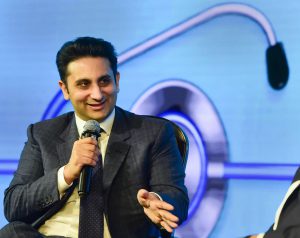Mr Adar Poonawalla, Chief Executive Officer, Serum Institute of India explained how the Institute had to raise export and capacity, and also empower the team, to be able to produce vaccines on such a large scale. He also emphasized how capacity and resilience have to be built to ensure India’s health security at AIMA’s National Leadership Conclave 2022.
Mr Adar Poonawalla, Chief Executive Officer, Serum Institute of India addressed the audience from the panel in one of AIMA’s National Leadership Conclave sessions on how strong measures have to be taken to build capacity and resilience in the health care supply chain to ensure India’s health security under all circumstances, in addition to narrating the journey of how his company produced vaccines during the pandemic.
Mr Poonawala started the session by ruminating on how Serum worked on the export and raised the capacity, and also empowered the team to be able to do things ahead of time, which only became the reasons for the Institute to be able to produce vaccines that exceeding expectations, during the commencement of the covid pandemic.
He explained how he took the decision of producing the vaccines by partnering with renowned universities and academia, investing the company’s own money in it, raising capital from other countries, and building capacity, even though being in a legacy business, which is why the company was able to produce vaccines in bulks.
So, what was the challenge for the company in its venture of producing the vaccines? Was it the vision, the execution, or the expectation? Mr Poonawala said that even after producing vaccines on large scales, the expectation was always there for more hence it got into a tremendous execution mode to produce as much it could. He however said that “The execution part was the hardest because, given the situation and the information we had at that time, we did everything that we possibly could”. The procuring of raw materials, the bringing in of international experts during the lockdown, also getting the permissions and licenses and training of the staff with new techniques. whilst raising capital to be able to pay for all these, besides handling the media’s critique also, was a challenging situation, but a learning curve, he said.
But why did Serum choose to produce Covishield when there were multiple options to choose from? About 500 institutions announced that they’d produce a vaccine when the pandemic started, but without being deterred by such claims and announcements, Serum made a checklist of the factors and features of the vaccine it would produce, which included, cost-effectiveness, scalability, utilization of proven technology and storage efficacy.
The next step was partnering with the appropriate medium. In Serum’s case, it was the Oxford University, with which it had collaborated before. Mr Poonawala further said that he wanted Serum to be the first few players to produce vaccines.
Also adding his personal thoughts about the journey, Mr Poonawala said that he is wary of failures. Besides, he also didn’t want to put his company’s name at stake when producing vaccines. “Avoiding any kind of negative feedback or criticism makes me more focused to not falter in any of my undertakings”, he added.
On tackling the new variants of covid, Mr Poonawala said that boosting is important to build resilience and for being protected. He added that he has been requesting the government to reduce the gap in the booster dose from 9 months to 6 months, besides saying that it is important to vaccinate the population before a wave starts. He also stressed the fact that there should be an annual drive for boosting. And now that the prices have also been slashed, it should be easier to have access to it.
Finally, Mr Poonawala also said that he is working on a Global Pandemic Treaty, which proposes a global harmonization of regulatory standards, mutual recognition of vaccine certifications, an easy procurement of both raw materials, and easy access to vaccines to deal with any kind of pandemic in the future.
Watch Full Session Video here: https://youtu.be/hlAxKgoP3hQ




